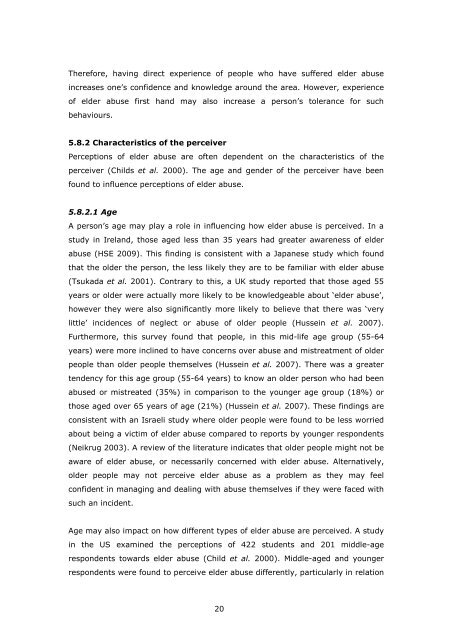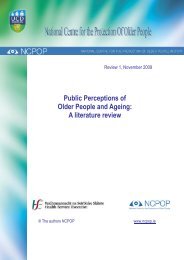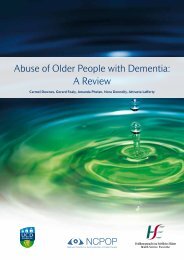Public Perceptions of Elder Abuse - Global Action on Aging
Public Perceptions of Elder Abuse - Global Action on Aging
Public Perceptions of Elder Abuse - Global Action on Aging
You also want an ePaper? Increase the reach of your titles
YUMPU automatically turns print PDFs into web optimized ePapers that Google loves.
Therefore, having direct experience <str<strong>on</strong>g>of</str<strong>on</strong>g> people who have suffered elder abuse<br />
increases <strong>on</strong>e’s c<strong>on</strong>fidence and knowledge around the area. However, experience<br />
<str<strong>on</strong>g>of</str<strong>on</strong>g> elder abuse first hand may also increase a pers<strong>on</strong>’s tolerance for such<br />
behaviours.<br />
5.8.2 Characteristics <str<strong>on</strong>g>of</str<strong>on</strong>g> the perceiver<br />
<str<strong>on</strong>g>Percepti<strong>on</strong>s</str<strong>on</strong>g> <str<strong>on</strong>g>of</str<strong>on</strong>g> elder abuse are <str<strong>on</strong>g>of</str<strong>on</strong>g>ten dependent <strong>on</strong> the characteristics <str<strong>on</strong>g>of</str<strong>on</strong>g> the<br />
perceiver (Childs et al. 2000). The age and gender <str<strong>on</strong>g>of</str<strong>on</strong>g> the perceiver have been<br />
found to influence percepti<strong>on</strong>s <str<strong>on</strong>g>of</str<strong>on</strong>g> elder abuse.<br />
5.8.2.1 Age<br />
A pers<strong>on</strong>’s age may play a role in influencing how elder abuse is perceived. In a<br />
study in Ireland, those aged less than 35 years had greater awareness <str<strong>on</strong>g>of</str<strong>on</strong>g> elder<br />
abuse (HSE 2009). This finding is c<strong>on</strong>sistent with a Japanese study which found<br />
that the older the pers<strong>on</strong>, the less likely they are to be familiar with elder abuse<br />
(Tsukada et al. 2001). C<strong>on</strong>trary to this, a UK study reported that those aged 55<br />
years or older were actually more likely to be knowledgeable about ‘elder abuse’,<br />
however they were also significantly more likely to believe that there was ‘very<br />
little’ incidences <str<strong>on</strong>g>of</str<strong>on</strong>g> neglect or abuse <str<strong>on</strong>g>of</str<strong>on</strong>g> older people (Hussein et al. 2007).<br />
Furthermore, this survey found that people, in this mid-life age group (55-64<br />
years) were more inclined to have c<strong>on</strong>cerns over abuse and mistreatment <str<strong>on</strong>g>of</str<strong>on</strong>g> older<br />
people than older people themselves (Hussein et al. 2007). There was a greater<br />
tendency for this age group (55-64 years) to know an older pers<strong>on</strong> who had been<br />
abused or mistreated (35%) in comparis<strong>on</strong> to the younger age group (18%) or<br />
those aged over 65 years <str<strong>on</strong>g>of</str<strong>on</strong>g> age (21%) (Hussein et al. 2007). These findings are<br />
c<strong>on</strong>sistent with an Israeli study where older people were found to be less worried<br />
about being a victim <str<strong>on</strong>g>of</str<strong>on</strong>g> elder abuse compared to reports by younger resp<strong>on</strong>dents<br />
(Neikrug 2003). A review <str<strong>on</strong>g>of</str<strong>on</strong>g> the literature indicates that older people might not be<br />
aware <str<strong>on</strong>g>of</str<strong>on</strong>g> elder abuse, or necessarily c<strong>on</strong>cerned with elder abuse. Alternatively,<br />
older people may not perceive elder abuse as a problem as they may feel<br />
c<strong>on</strong>fident in managing and dealing with abuse themselves if they were faced with<br />
such an incident.<br />
Age may also impact <strong>on</strong> how different types <str<strong>on</strong>g>of</str<strong>on</strong>g> elder abuse are perceived. A study<br />
in the US examined the percepti<strong>on</strong>s <str<strong>on</strong>g>of</str<strong>on</strong>g> 422 students and 201 middle-age<br />
resp<strong>on</strong>dents towards elder abuse (Child et al. 2000). Middle-aged and younger<br />
resp<strong>on</strong>dents were found to perceive elder abuse differently, particularly in relati<strong>on</strong><br />
20









